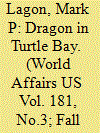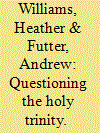| Srl | Item |
| 1 |
ID:
163919


|
|
|
|
|
| Summary/Abstract |
China’s role in the United Nations (UN) is steadily rising at a time the United States is seeking burden-sharing and rethinking its multilateral leadership role. This article highlights that China’s increasing role in three critical areas—(1) UN peacekeeping; (2) the work of the UN on human rights, particularly in the Human Rights Council; and (3) the governance of the digital realm and Internet freedom—has significant implications for U.S. interests and broader global governance efforts. Although China’s transformation into a responsible stakeholder in various areas of the UN’s work could be promising, Beijing’s attempts to alter existing liberal norms bear close examination. Those seeking a larger Chinese role in the UN might best be careful what they wish for. Despite the emergence of populism and some skepticism of multilateral arrangements in their domestic politics, the United States and like-minded nations have an interest in reinforcing liberal norms in these three areas of global governance and beyond.
|
|
|
|
|
|
|
|
|
|
|
|
|
|
|
|
| 2 |
ID:
153981


|
|
|
|
|
| Summary/Abstract |
Few foreign policy issues have attracted more recent attention than the fate of the post-war liberal international order. There is abundant evidence that its norms and institutions have helped stabilize world politics and promote U.S. interests.
|
|
|
|
|
|
|
|
|
|
|
|
|
|
|
|
| 3 |
ID:
150100


|
|
|
|
|
| Summary/Abstract |
Despite renewed enthusiasm for nuclear disarmament, a contemporary security environment far removed from that of the Cold War, and increasing budgetary pressures at home, U.S. interests continue to be best served by retaining a triad of nuclear forces. While options for a reduced force structure may appear to offer short-term political and economic expediency, in the long run a three-legged deterrent—possibly consisting of fewer delivery vehicles, operational warheads and even potentially de-alerted forces—represents the best way to balance the competing requirements of contemporary and future U.S. nuclear policy. Indeed, it may be that retaining the triad provides the most realistic method of reestablishing U.S.-Russia strategic stability, and the most credible basis for advancing the drive for global nuclear reductions, strengthening global nuclear security, and even working toward nuclear abolition.
|
|
|
|
|
|
|
|
|
|
|
|
|
|
|
|
| 4 |
ID:
138733


|
|
|
|
|
| Summary/Abstract |
The attacks of 9/11 spurred the U.S. to pursue national security interests in Afghanistan through expensive, overlapping strategies. The Afghan War helped elicit changes in the region that produced new American interests there. Because of a modern ‘‘Great Game’’ between regional and global actors in and around Afghanistan, the U.S. cannot afford to withdraw from the region.
|
|
|
|
|
|
|
|
|
|
|
|
|
|
|
|
| 5 |
ID:
149631


|
|
|
|
|
| Summary/Abstract |
Should the United States commit its unrivaled power to spreading democracy and cementing Washington’s leadership of the liberal international order that has provided decades of stability and security but has come under increasing strain in recent years? Or would U.S. interests be better served by less American intervention in world affairs—and, in particular, by less exertion of U.S. military force? Theorists and policymakers have argued over those questions for decades, especially since the end of the Cold War. During the past eight years, the Obama administration has changed the terms of the debate by pursuing a strategy of retrenchment.
|
|
|
|
|
|
|
|
|
|
|
|
|
|
|
|